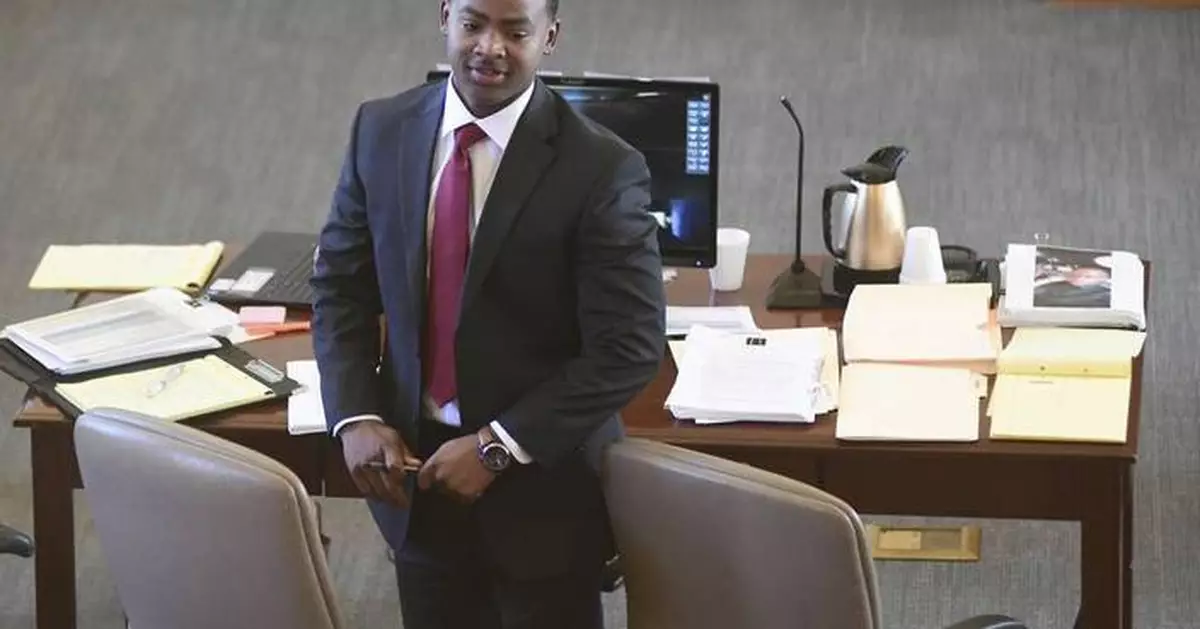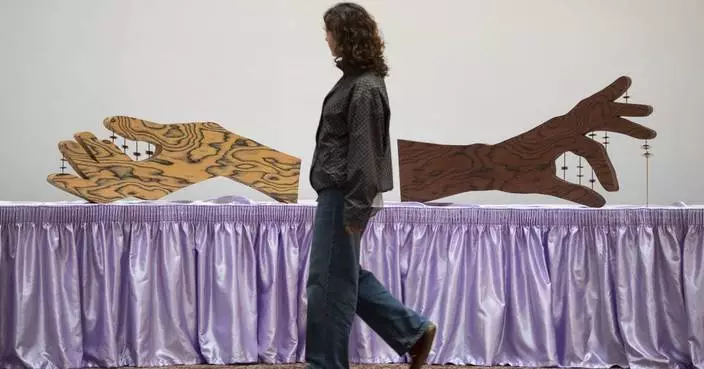A University of Mississippi student who disappeared in 2022 was a happy person who spoke with his mother daily and called her every year to sing happy birthday, his mom testified Tuesday in the trial of the man charged with killing her son.
Stephanie Lee of Jackson, Mississippi, said her 20-year-old son, Jimmy “Jay” Lee, texted her at about 2 a.m. on July 8, 2022, to wish her a happy birthday. She said she saw the text when she woke up later, and she responded with a smile emoji, expecting to hear from him again. She said he never called.
Click to Gallery
Defense attorney Kevin Horan makes an opening statement during the trial of Sheldon Timothy Herrington Jr., who is on trial for the murder of University of Mississippi student Jimmie "Jay" Lee, in Oxford, Miss. on Tuesday, Dec. 3, 2024. (Bruce Newman/The Northeast Daily Journal via AP, Pool)
Stephanie Lee, mother of University of Mississippi student Jimmie "Jay" Lee, cries as she testifies at the trial of Sheldon Timothy Herrington Jr., who is on trial on a capital murder charge in the 2022 death of Jay Lee, in Oxford, Miss. on Tuesday, Dec. 3, 2024. (Bruce Newman/The Northeast Daily Journal via AP, Pool)
Stephanie Lee, mother of University of Mississippi student Jimmie "Jay" Lee, testifies at the trial of Sheldon Timothy Herrington Jr., who is on trial on a capital murder charge in the 2022 death of Jay Lee, in Oxford, Miss. on Tuesday, Dec. 3, 2024. (Bruce Newman/The Northeast Daily Journal via AP, Pool)
Sheldon Timothy Herrington Jr., foreground, who is on trial for the murder of University of Mississippi student Jimmie "Jay" Lee, looks over at his attorney in Oxford, Miss. on Tuesday, Dec. 3, 2024. (Bruce Newman/The Northeast Daily Journal via AP, Pool)
Defense attorney Kevin Horan makes an opening statement during the trial of Sheldon Timothy Herrington Jr., who is on trial for the murder of University of Mississippi student Jimmie "Jay" Lee, in Oxford, Miss. on Tuesday, Dec. 3, 2024. (Bruce Newman/The Northeast Daily Journal via AP, Pool)
Sheldon Timothy Herrington Jr., who is on trial on a capital murder charge in the 2022 death of University of Mississippi student Jimmie "Jay" Lee, looks out into the courtroom during the lunch break, in Oxford, Miss., on Tuesday, Dec. 3, 2024. (Bruce Newman/The Northeast Mississippi Daily Journal via AP, Pool)
Sheldon Timothy Herrington Jr., who is on trial on a capital murder charge in the 2022 death of University of Mississippi student Jimmie "Jay" Lee, looks out into the courtroom during the lunch break, in Oxford, Miss., on Tuesday, Dec. 3, 2024. (Bruce Newman/The Northeast Mississippi Daily Journal via AP, Pool)
Sheldon Timothy Herrington Jr., who is on trial on a capital murder charge in the 2022 death of University of Mississippi student Jimmie "Jay" Lee, looks out into the courtroom during the lunch break, in Oxford, Miss. on Tuesday, Dec. 3, 2024. (Bruce Newman/The Northeast Daily Journal via AP, Pool)
Sheldon Timothy Herrington Jr., who is on trial on a capital murder charge in the 2022 death of University of Mississippi student Jimmie "Jay" Lee, looks out into the courtroom during the lunch break, in Oxford, Miss. on Tuesday, Dec. 3, 2024. (Bruce Newman/The Northeast Daily Journal via AP, Pool)
Sheldon “Timothy” Herrington Jr. of Grenada, Mississippi, is charged with capital murder in the death of Jay Lee, a gay man who was last seen alive in Oxford hours after he sent the birthday text to his mother.
Tuesday was the first day of Herrington's trial in Oxford, and Stephane Lee testified after attorneys made their opening arguments. She said she worried when hours passed and her son didn't call her to sing for her birthday.
Stephanie Lee said she checked Jay's phone location, called police multiple times asking them to do a welfare check on her son and had her oldest child reach out to one of Jay's friends to have that friend check Jay's apartment.
The friend, Jose' Reyes, testified Tuesday that he did not find Jay but said he could hear Jay's beloved Pomeranian dog, Lexus — nicknamed Lexie — barking inside.
Jay Lee was well-known in the LGBTQ+ community in Oxford and the University of Mississippi. His body has not been found. In October, a judge declared him dead after Lee’s parents requested that declaration.
Herrington has maintained his innocence.
An assistant district attorney, Gwen Agho, told jurors Tuesday that Lee was a confident person who dressed as he liked, sometimes wearing high heels.
“He walked to his own beat,” Agho said. “He knew who he was.”
Lee and Herrington saw each other twice during the hours before Lee disappeared, Agho said. She said the men had sexual contact during their first meeting, and Lee was upset when he left Herrington's apartment.
Herrington invited Lee back — and before Lee arrived, Herrington searched online for how long it takes to strangle someone, Agho said.
Herrington “was not openly in the LGBTQ community,” Agho said.
Herrington's attorney, Kevin Horan, told jurors that prosecutors have “zero” proof Lee was killed or that any crime occurred in Herrington's apartment or car or in Lee's car.
“You are not going to hear anything that supports a finding of a killing or death, period,” Horan said.
Multiple law enforcement agencies used 71 search warrants, and “they haven't recovered not one bit of direct evidence to support this case," Horan said.
Jurors were chosen Monday in Forrest County, about 250 miles (402 kilometers) south of Oxford. The trial is being held at the Lafayette County Courthouse in Oxford.
Both Herrington and Lee had graduated from the University of Mississippi. Lee was pursuing a master’s degree.
Lee was known for his creative expression through fashion and makeup and often performed in drag shows in Oxford, according to a support group called Justice for Jay Lee.
Horan asked Reyes if Lee dressed “in a feminine manner” to try to attract men.
“He dressed as Jay Lee,” Reyes said.
Police said cellphone history showed conversations between Herrington and Lee the morning that Lee disappeared. Surveillance video recorded Herrington running from where Lee’s car was found, and he was later seen picking up a shovel and wheelbarrow at his parents’ house, authorities said.
Herrington, who had graduated from the University of Mississippi, was arrested two weeks after Lee vanished, then released five months later on a $250,000 bond after agreeing to surrender his passport and wear an ankle monitor. A grand jury indicted him in March 2023.
Prosecutors have announced they do not intend to pursue the death penalty, meaning Herrington could get a life sentence if convicted. Mississippi law defines capital murder as a killing committed along with another felony — in this case, kidnapping.
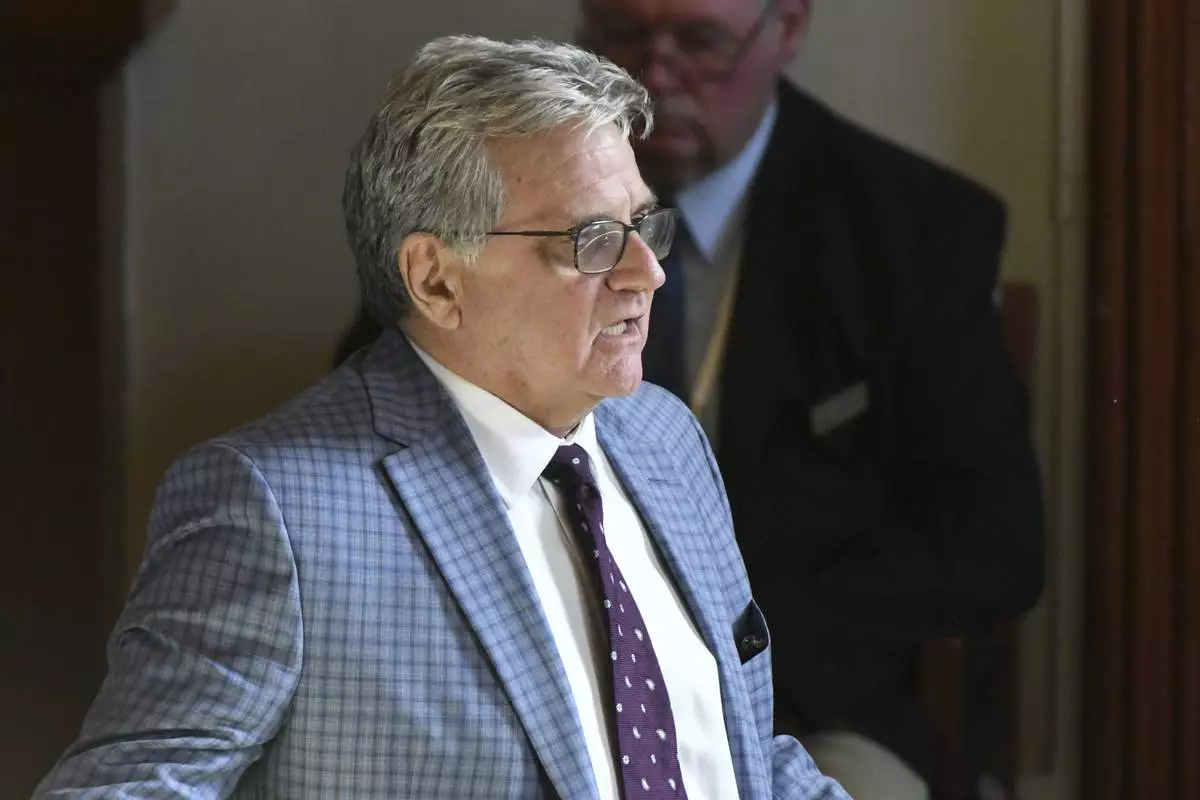
Defense attorney Kevin Horan makes an opening statement during the trial of Sheldon Timothy Herrington Jr., who is on trial for the murder of University of Mississippi student Jimmie "Jay" Lee, in Oxford, Miss. on Tuesday, Dec. 3, 2024. (Bruce Newman/The Northeast Daily Journal via AP, Pool)

Stephanie Lee, mother of University of Mississippi student Jimmie "Jay" Lee, cries as she testifies at the trial of Sheldon Timothy Herrington Jr., who is on trial on a capital murder charge in the 2022 death of Jay Lee, in Oxford, Miss. on Tuesday, Dec. 3, 2024. (Bruce Newman/The Northeast Daily Journal via AP, Pool)

Stephanie Lee, mother of University of Mississippi student Jimmie "Jay" Lee, testifies at the trial of Sheldon Timothy Herrington Jr., who is on trial on a capital murder charge in the 2022 death of Jay Lee, in Oxford, Miss. on Tuesday, Dec. 3, 2024. (Bruce Newman/The Northeast Daily Journal via AP, Pool)
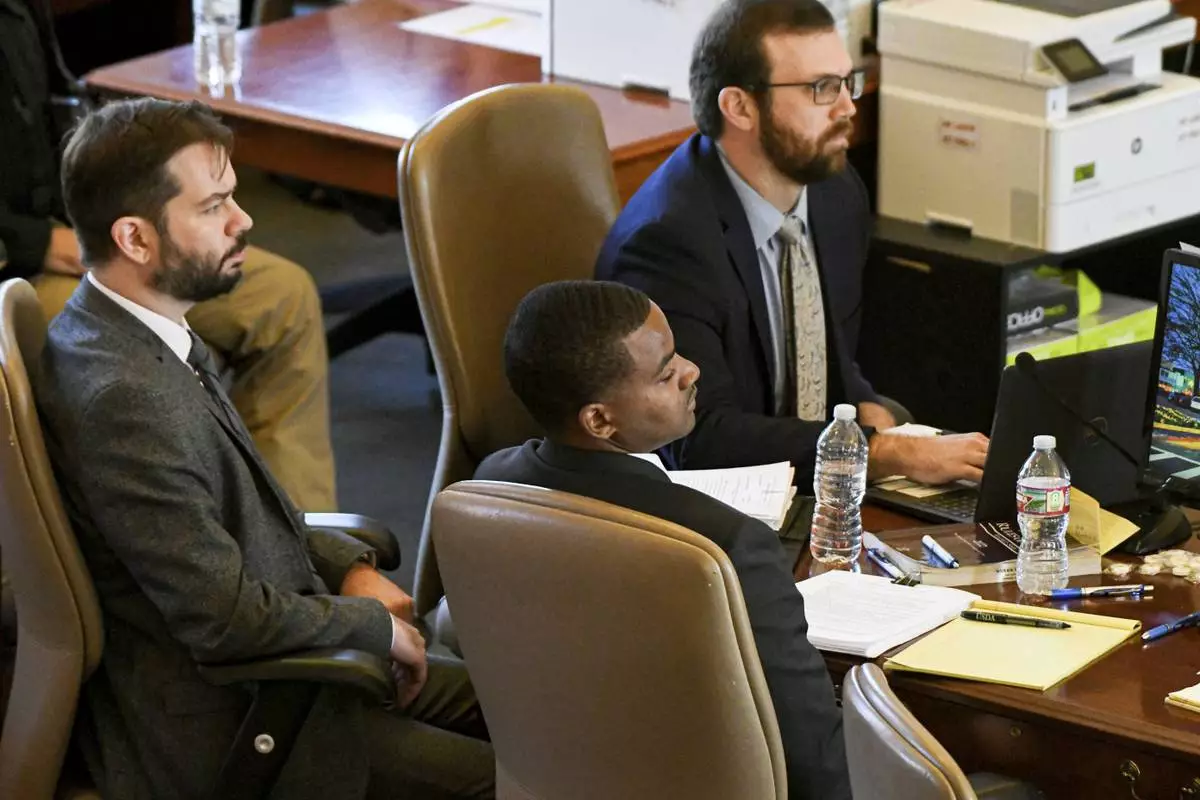
Sheldon Timothy Herrington Jr., foreground, who is on trial for the murder of University of Mississippi student Jimmie "Jay" Lee, looks over at his attorney in Oxford, Miss. on Tuesday, Dec. 3, 2024. (Bruce Newman/The Northeast Daily Journal via AP, Pool)

Defense attorney Kevin Horan makes an opening statement during the trial of Sheldon Timothy Herrington Jr., who is on trial for the murder of University of Mississippi student Jimmie "Jay" Lee, in Oxford, Miss. on Tuesday, Dec. 3, 2024. (Bruce Newman/The Northeast Daily Journal via AP, Pool)

Sheldon Timothy Herrington Jr., who is on trial on a capital murder charge in the 2022 death of University of Mississippi student Jimmie "Jay" Lee, looks out into the courtroom during the lunch break, in Oxford, Miss., on Tuesday, Dec. 3, 2024. (Bruce Newman/The Northeast Mississippi Daily Journal via AP, Pool)
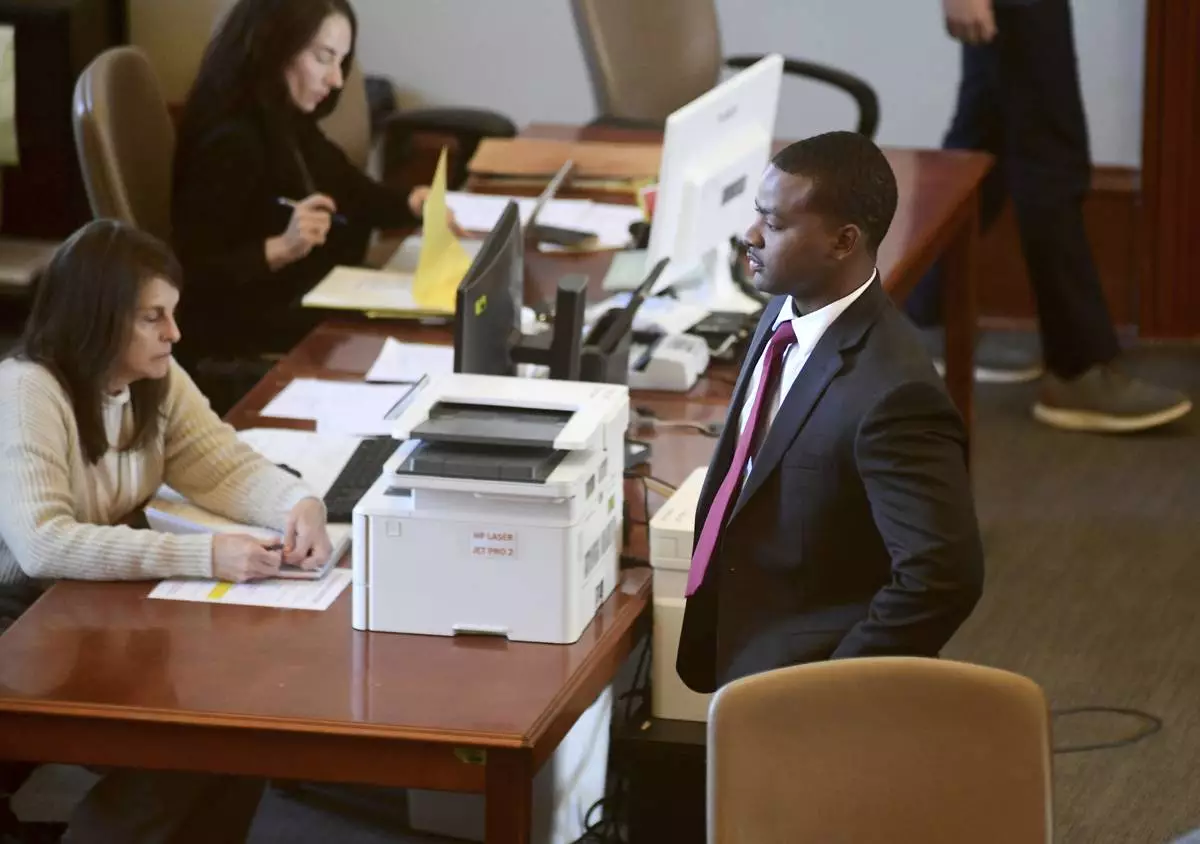
Sheldon Timothy Herrington Jr., who is on trial on a capital murder charge in the 2022 death of University of Mississippi student Jimmie "Jay" Lee, looks out into the courtroom during the lunch break, in Oxford, Miss., on Tuesday, Dec. 3, 2024. (Bruce Newman/The Northeast Mississippi Daily Journal via AP, Pool)
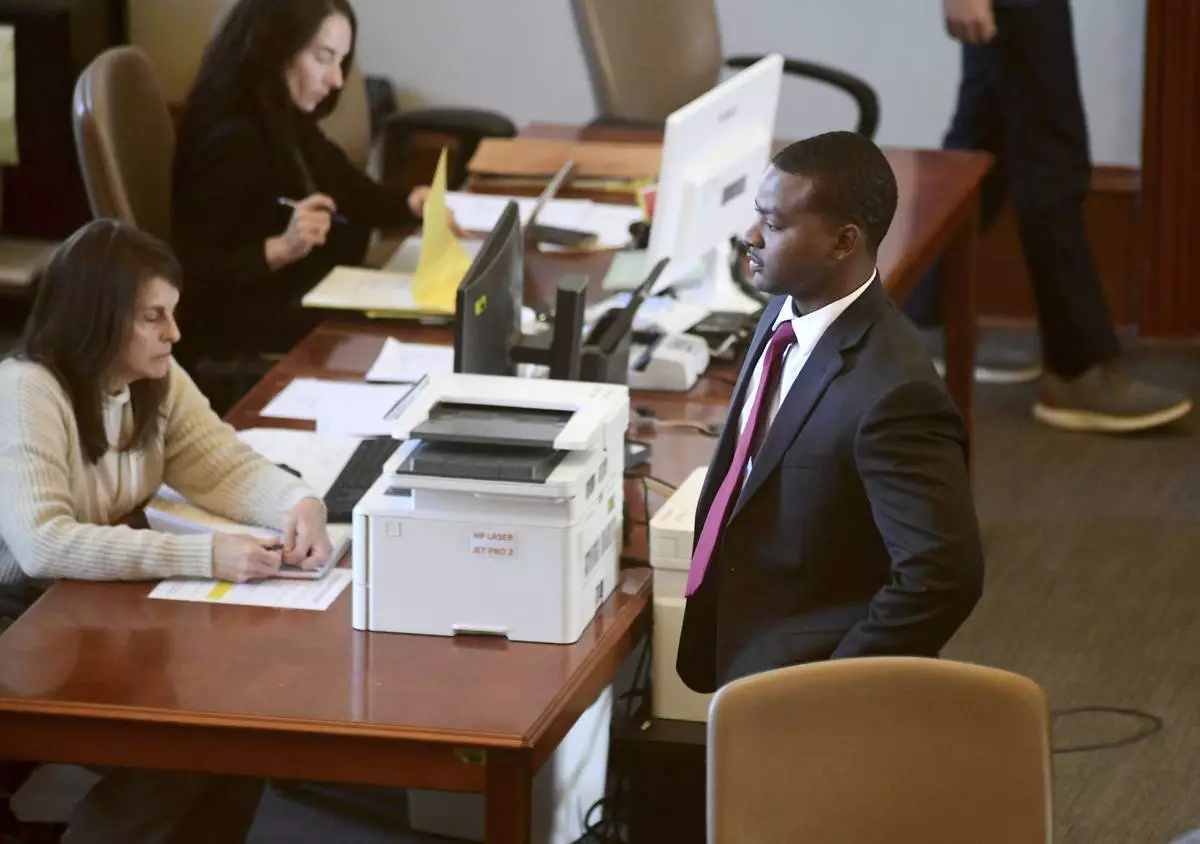
Sheldon Timothy Herrington Jr., who is on trial on a capital murder charge in the 2022 death of University of Mississippi student Jimmie "Jay" Lee, looks out into the courtroom during the lunch break, in Oxford, Miss. on Tuesday, Dec. 3, 2024. (Bruce Newman/The Northeast Daily Journal via AP, Pool)

Sheldon Timothy Herrington Jr., who is on trial on a capital murder charge in the 2022 death of University of Mississippi student Jimmie "Jay" Lee, looks out into the courtroom during the lunch break, in Oxford, Miss. on Tuesday, Dec. 3, 2024. (Bruce Newman/The Northeast Daily Journal via AP, Pool)
Social media users are misrepresenting a Vermont Supreme Court ruling, claiming that it gives schools permission to vaccinate children even if their parents do not consent.
The ruling addressed a lawsuit filed by Dario and Shujen Politella against Windham Southeast School District and state officials over the mistaken vaccination of their child against COVID-19 in 2021, when he was 6 years old. A lower court had dismissed the original complaint, as well as an amended version. An appeal to the U.S. Supreme Court was filed on Nov. 19.
But the ruling by Vermont's high court is not as far-reaching as some online have claimed. In reality, it concluded that anyone protected under the Public Readiness and Emergency Preparedness Act, or PREP, Act is immune to state lawsuits.
Here's a closer look at the facts.
CLAIM: The Vermont Supreme Court ruled that schools can vaccinate children against their parents' wishes.
THE FACTS: The claim stems from a July 26 ruling by the Vermont Supreme Court, which found that anyone protected by the PREP Act is immune to state lawsuits, including the officials named in the Politella's suit. The ruling does not authorize schools to vaccinate children at their discretion.
According to the lawsuit, the Politella's son — referred to as L.P. — was given one dose of the Pfizer BioNTech COVID-19 vaccine at a vaccination clinic held at Academy School in Brattleboro even though his father, Dario, told the school's assistant principal a few days before that his son was not to receive a vaccination. In what officials described as a mistake, L.P. was removed from class and had a “handwritten label” put on his shirt with the name and date of birth of another student, L.K., who had already been vaccinated that day. L.P. was then vaccinated.
Ultimately, the Vermont Supreme Court ruled that officials involved in the case could not be sued.
“We conclude that the PREP Act immunizes every defendant in this case and this fact alone is enough to dismiss the case,” the Vermont Supreme Court's ruling reads. “We conclude that when the federal PREP Act immunizes a defendant, the PREP Act bars all state-law claims against that defendant as a matter of law.”
The PREP Act, enacted by Congress in 2005, authorizes the secretary of the Department of Health and Human Services to issue a declaration in the event of a public health emergency providing immunity from liability for activities related to medical countermeasures, such as the administration of a vaccine, except in cases of “willful misconduct" that result in “death or serious physical injury.” A declaration against COVID-19 was issued on March 17, 2020. It is set to expire on Dec. 31. Federals suits claiming willful misconduct are filed in Washington.
Social media users described the Vermont Supreme Court's ruling as having consequences beyond what it actually says.
“The Vermont Supreme Court has ruled that schools can force-vaccinate children for Covid against the wishes of their parents,” reads one X post that had been liked and shared approximately 16,600 times as of Tuesday. “The high court ruled on a case involving a 6-year-old boy who was forced to take a Covid mRNA injection by his school. However, his family had explicitly stated that they didn't want their child to receive the ‘vaccines.’”
Other users alleged that the ruling gives schools permission to give students any vaccine without parental consent, not just ones for COVID-19.
Rod Smolla, president of the Vermont Law and Graduate School and an expert on constitutional law, told The Associated Press that the ruling “merely holds that the federal statute at issue, the PREP Act, preempts state lawsuits in cases in which officials mistakenly administer a vaccination without consent.”
“Nothing in the Vermont Supreme Court opinion states that school officials can vaccinate a child against the instructions of the parent,” he wrote in an email.
Asked whether the claims spreading online have any merit, Ronald Ferrara, an attorney representing the Politellas, told the AP that although the ruling doesn't say schools can vaccinate students regardless of parental consent, officials could interpret it to mean that they could get away with doing so under the PREP Act, at least when it comes to COVID-19 vaccines. He explained that the U.S. Supreme Court appeal seeks to clarify whether the Vermont Supreme Court interpreted the PREP Act beyond what Congress intended.
“The Politella’s fundamental liberty interest to decide whether their son should receive elective medical treatment was denied by agents of the State and School,” he wrote in an email to the AP. “The Vermont Court misconstrues the scope of PREP Act immunity (which is conditioned upon informed consent for medical treatments unapproved by FDA), to cover this denial of rights and its underlying battery.”
Ferrara added that he was not aware of the claims spreading online, but that he “can understand how lay people may conflate the court's mistaken grant of immunity for misconduct as tantamount to blessing such misconduct.”
John Klar, who also represents the Politellas, went a step further, telling the AP that the Vermont Supreme Court ruling means that “as a matter of law” schools can get away with vaccinating students without parental consent and that parents can only sue on the federal level if death or serious bodily injury results.
—
Find AP Fact Checks here: https://apnews.com/APFactCheck.

Holiday visitors walk in downtown Woodstock, Vt., during a Thanksgiving Day snowstorm, Thursday, Nov. 28, 2024. (AP Photo/Robert F. Bukaty)











